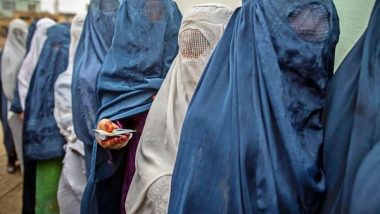Kabul, July 4: The plight of women in Afghanistan continues to be deplorable despite the tall claims made by the Taliban when they took Kabul's control in August last year.
The Taliban had previously promised of an inclusive society and equality during their first press conference after the takeover of Afghanistan, the Afghan Diaspora publication said. Afghanistan: Taliban Dismisses UNSC’s Call To Reverse Restrictions on Afghan Women.
On the contrary, girls were stopped from going to school beyond sixth grade on March 23 and a decree against the women's dress code was issued after a month.
The piece read that women are nearly 40 million population of the country, but they are still suffering and struggling for their fundamental rights like education and health.
A degree legitimising the hijab was issued by Akif Mahajar, the spokesperson of the Ministry for the Propagation of Virtue and the Prevention of Vice, under the leadership of Maulavi Hibatullah Akhundzada.
A three-page statement was issued by the Taliban that emphasised the dress code for women, and the guardians of the women will be summoned and punished according to the Taliban court if the dress code is not followed. There are restrictions on movement, education and freedom of expression of women posing a threat to their survival.
According to locals, the Taliban has prevented women from using smartphones, and the Women's Affair Ministry often extort money for providing essential protection.
Lack of female healthcare workers have prevented the women from accessing basic medical facilties, and the international donors, who fund 90 per cent of health clinics, are hesitant to send money because of their fear of the funds being misused.
Article 6,7 and 12 of the International Covenant on Civil and Political Rights (ICCPR) provides right to life, freedom from torture and other cruel treatments, and the right to medical care. Despite being a member of the ICCPR, women in Afghanistan have suffered due to the cultural and religious interpretations by the Taliban, the Afghan Diaspora said.
Around 80 per cent of women working in the media have lost their jobs, it said adding that almost 18 million women in the country are struggling for health, education and social rights.
(This is an unedited and auto-generated story from Syndicated News feed, LatestLY Staff may not have modified or edited the content body)













 Quickly
Quickly





















